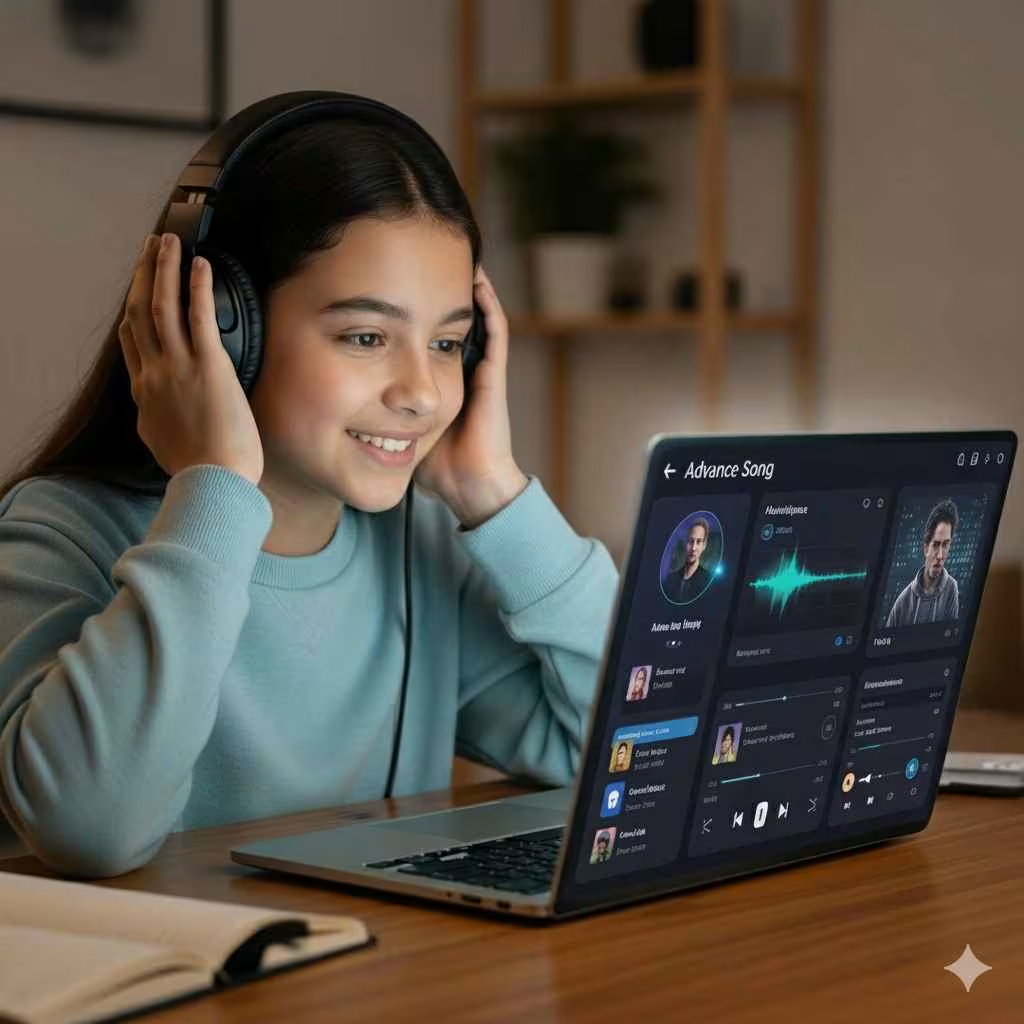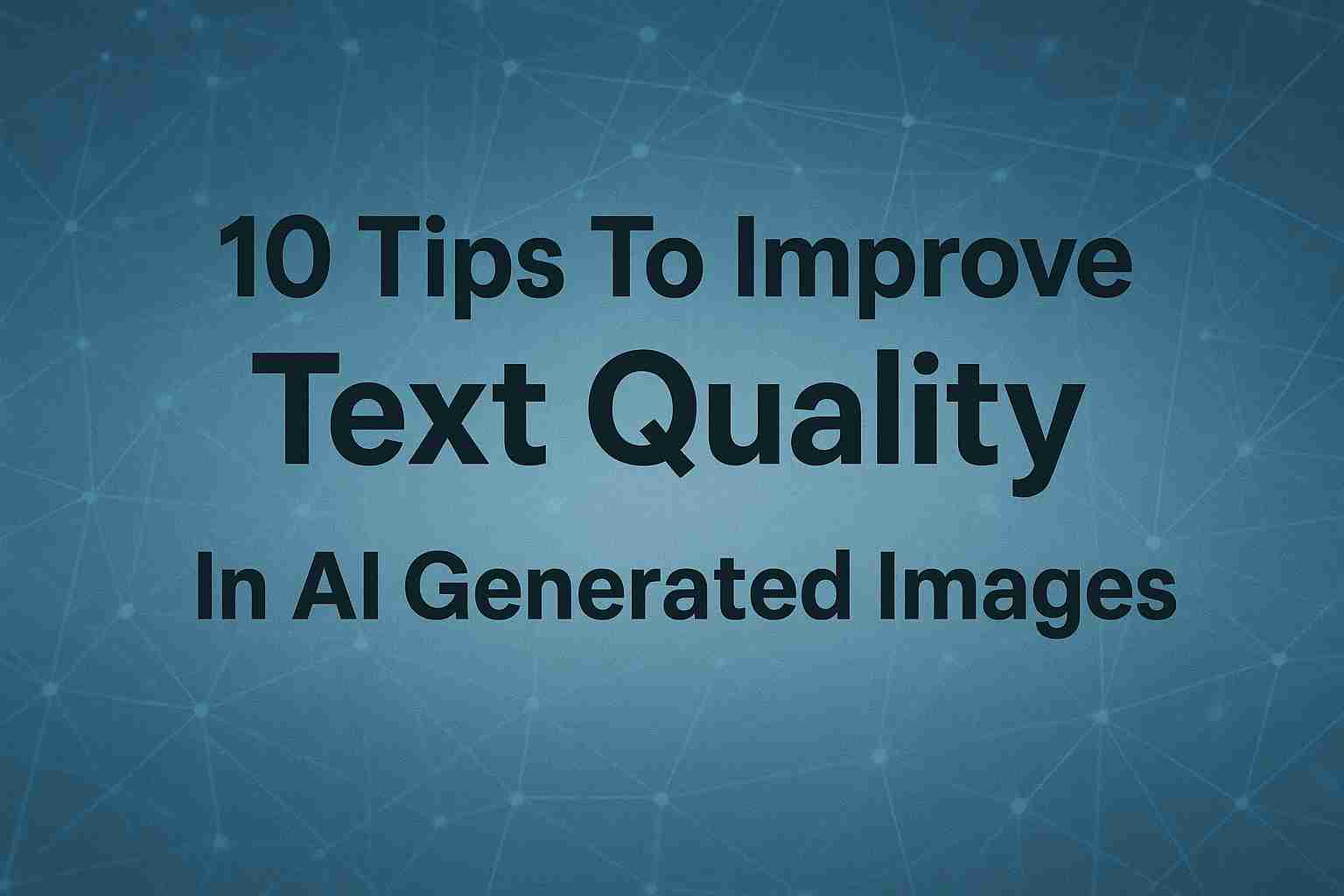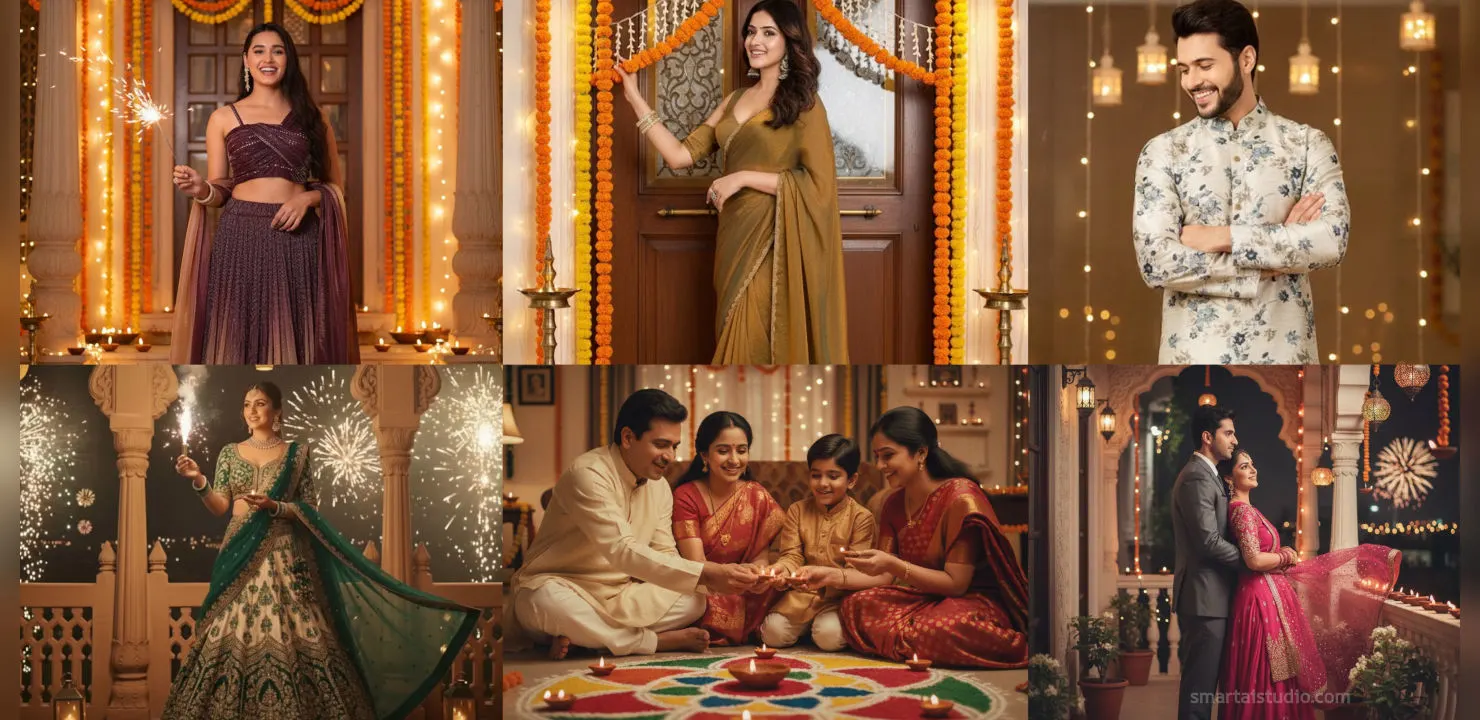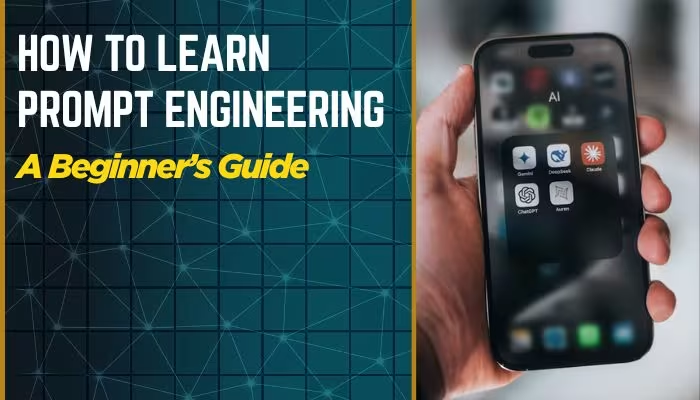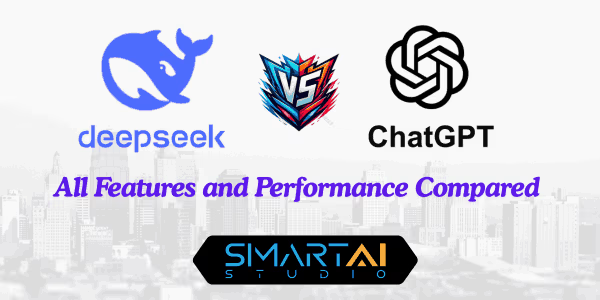Did you know that the global market for AI-generated music is projected to grow to over $2 billion by 2030? This astonishing growth isn’t just a buzzword; it’s a quiet revolution reshaping how music is made.
From bedroom artists to major film studios, the way we create sounds is no longer limited to traditional instruments and expensive recording sessions. An AI song generator is an innovative tool that uses artificial intelligence to compose, produce, and even perform music.
It’s making music accessible to everyone, regardless of their musical background or budget. In this article, we will demystify this technology, explore who can benefit from it, discuss the key features to look for, and peer into the future of music creation.
What Exactly Is An AI Song Generator?
At its core, an AI song generator is a software program that leverages machine learning to create original music. Think of it as a creative partner that understands musical patterns, genres, and structures.
Just as tools like ChatGPT can write text and Midjourney can generate images from a simple prompt, an AI music generator can produce a full song, complete with melody, harmony, rhythm, and even lyrics, from a few descriptive words.
Instead of needing to know how to play an instrument or read sheet music, you can simply describe the sound you want, such as “a calm jazz tune for studying” or “an energetic hip-hop beat,” and the AI does the rest.
The Core Technology: How AI Composes Music
The magic behind these tools lies in a field of AI called generative adversarial networks (GANs) and other deep learning models. These models are trained on massive datasets of existing music, millions of songs, spanning every genre imaginable.
The AI learns to identify intricate patterns, from the chord progressions of a pop song to the rhythmic complexities of a classical piece.
By understanding these relationships, the AI can then generate something entirely new. It’s not just stitching together existing clips; it’s creating original compositions based on the learned rules of music.
This process is similar to how a human composer learns by studying the works of masters and then applies those lessons to write their own piece.
The AI learns the fundamental “grammar” of music and uses it to construct a unique song from the ground up.
Who Uses AI Song Generators and Why?
The beauty of this technology is its wide range of applications. It has found a place in the creative workflows of professionals and enthusiasts.
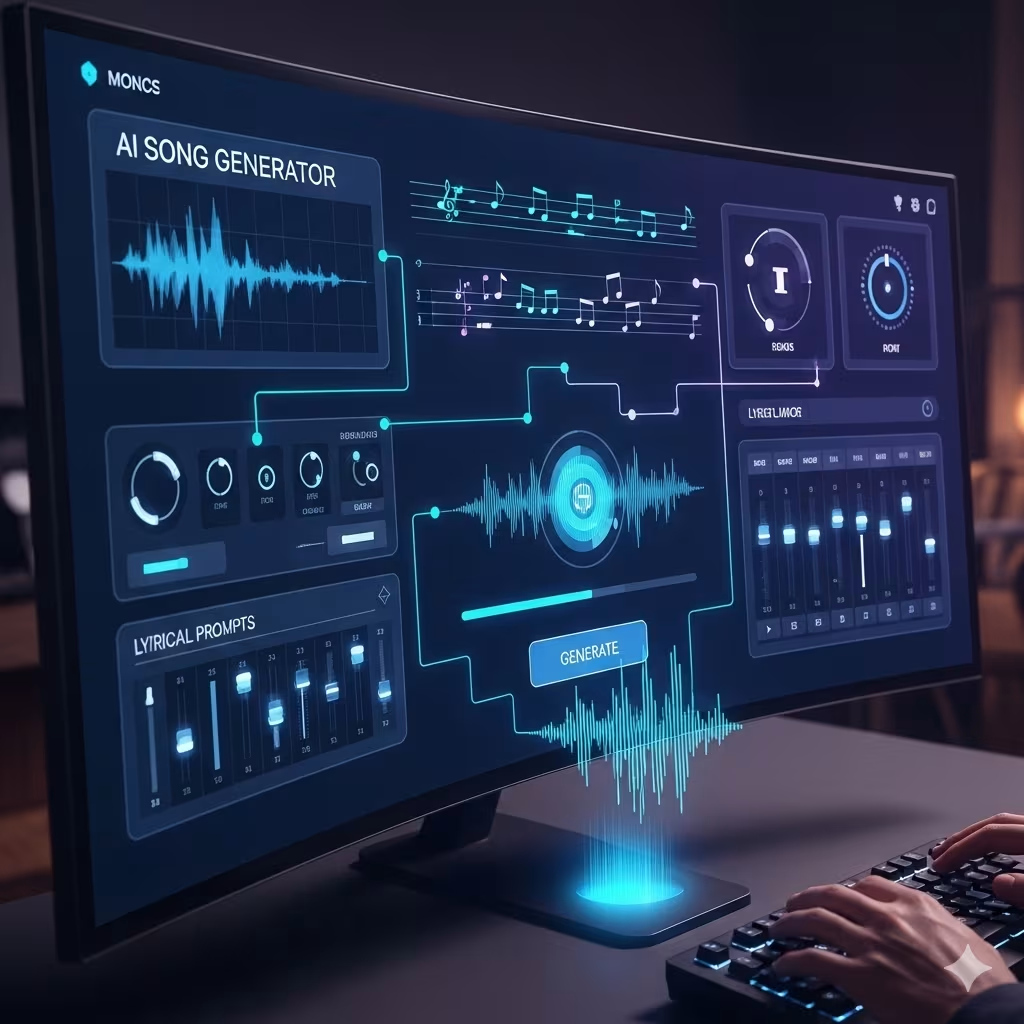
For Content Creators
Content creators are one of the biggest beneficiaries of AI music creation. Finding the perfect soundtrack for a YouTube video, a podcast episode, or a short film can be time-consuming and expensive.
The music has to be royalty-free to avoid copyright issues, and stock music libraries can feel generic. With an AI song generator, a creator can quickly generate a unique, tailor-made track that perfectly matches the mood of their content.
For example, a travel vlogger could prompt the AI for “a hopeful, cinematic soundtrack with a touch of acoustic guitar” to accompany their footage, instantly getting a one-of-a-kind piece of music without the legal or financial hassle.
For Aspiring Musicians
For those who dream of making music but lack the technical skills, AI is a game-changer. It can act as a digital bandmate, helping you get ideas out of your head and into a tangible format.
An aspiring songwriter could use an AI song generator to create a quick demo, providing a basic melody and beat to work with. This can help overcome writer’s block and speed up the creative process.
It allows artists to focus on what they do best, lyrics and vocals, while the AI handles the instrumental composition.
For Businesses & Marketers
Businesses need audio for everything from marketing videos to on-hold music. Hiring a music composer for every project is not feasible for most small and medium-sized businesses. An AI song generator offers a cost-effective solution for creating high-quality, brand-specific audio.
A company could generate a catchy jingle for a new ad campaign or create a relaxing background loop for their website, all customized to their specific needs.
Key Features To Look For In An AI Song Generator
Not all AI song generators are created equal. When choosing a tool, consider these essential features to ensure you get the best experience and the highest-quality results.
Text-to-Music vs. Lyrics-to-Music: Some tools can generate a full song from a text prompt describing the genre and mood, while others can take your lyrics and compose a melody and instrumental track to match. The best tools often offer both.
Audio Customization & Editing: Can you edit the generated track? Look for features that allow you to change the tempo, key, instruments, or song structure. The ability to fine-tune the AI’s output is crucial for making the song your own.
Vocal Generation & Removal: Many advanced AI music generators can create realistic-sounding vocals, either by synthesizing them from scratch or by using a voice model. On the flip side, some can remove vocals from existing tracks, which is a powerful tool for creating karaoke versions or instrumental backing tracks.
Royalty-Free Licensing: This is arguably the most important feature for anyone using the music for commercial purposes. Ensure the platform provides a clear, royalty-free license that allows you to use the generated music in your projects without having to pay additional fees or credit the AI.
Best AI Song Generators To Try Right Now
AI vs Human Creativity: A Symbiotic Relationship
One of the most common debates surrounding AI in the arts is whether it threatens human creativity. However, the reality is that an AI song generator is not a replacement for human artists; it’s a powerful new tool in their arsenal.
Think of it like the transition from oil paint to digital art software. While some purists may prefer traditional methods, no one would argue that digital tools have made human art obsolete. Instead, they have opened up new creative possibilities. AI offers a similar path for music.
Consider an independent artist named Sarah. She’s a talented lyricist and vocalist, but she struggles with music production and doesn’t play an instrument. Sarah decides to use an AI music generator to create an instrumental track that matches the emotional tone of her lyrics.
The AI generates a base track, which she then uses as a foundation. She adds her own unique vocals, records a live acoustic guitar part on top, and mixes everything. In this scenario, the AI didn’t replace Sarah’s creativity; it amplified it.
It removed a barrier to entry, allowing her to realize her vision faster and more effectively. The final song is a collaborative effort, blending the efficiency of AI with the irreplaceable soul of human expression.
The Challenges And Ethical Debates of AI Music
While the technology is exciting, it’s not without its challenges. The rapid rise of AI in creative fields has sparked important conversations about ethics, copyright, and the future of creative work.
A major concern revolves around copyright and intellectual property. Who owns the music generated by an AI? Is it the user, the AI platform, or the creators of the original music used to train the model?
The legal landscape is still catching up, leading to complex questions about originality and fair use. For instance, if an AI is trained on the works of a specific artist, can it generate new music that is “in the style of” that artist without violating their intellectual property? These are questions the industry is grappling with.
Additionally, the debate around the originality and “soul” in music continues. While an AI can produce technically perfect compositions, can it truly capture the raw emotion of a human experience?
Most artists would argue no. This is why the collaborative model, where AI assists rather than replaces, is likely to be the most promising path forward.
Tips For Creating Your First Song With AI
Ready to give it a try? Follow these simple steps to start creating your own music with an AI song generator.
- Choose Your Tool: Research different platforms to find one that fits your needs and budget. Look for a free trial or a freemium model to test out the features.
- Define Your Vibe: Before you generate anything, have a clear idea of what you want. Use descriptive words to create a powerful prompt. Think about the genre, mood, tempo, and even specific instruments you want to hear.
- Generate and Iterate: The first result might not be perfect. Experiment with different prompts and settings. Generate several versions and listen to them to find one that resonates with you.
- Edit and Refine: Use the customization tools to make the track truly your own. Don’t be afraid to change things, this is where your human creativity comes into play. Add your own vocals or mix it with other sounds to create something unique.
The Future of AI In The Music Industry
The AI we see today is just the starting point. Looking ahead, we can expect to see AI move beyond simple song generation to become an even more integrated part of the music-making process.
Imagine AI-powered mastering tools that can instantly perfect your mix, or personalized music streams that dynamically compose a song based on your current mood and environment.
AI could even assist with live performances, creating real-time improvisations or visual effects that respond to the music.
As the technology evolves, the line between human and artificial creativity will continue to blur, opening up an exciting new era for artists and listeners alike.
Conclusion
In short, an AI song generator is an accessible and powerful tool that is changing the music landscape. It democratizes music creation, allowing anyone with an idea to turn it into a song. From content creators looking for the perfect soundtrack to musicians seeking a new creative partner, the possibilities are endless.
While challenges related to ethics and copyright remain, the technology’s potential to enhance and accelerate human creativity is undeniable. Rather than seeing AI as a threat, the real potential lies in treating it as a powerful creative partner. Ready to explore this new frontier of sound? Check out more of our guides on AI tools to help you unlock your creative potential and build new skills for the future.
FAQ About AI Song Generator
Yes, as long as you use a platform that provides a clear, royalty-free license for the music you generate. Always read the terms and conditions to ensure you have the right to use the music for your specific purposes.
Many advanced platforms now can generate AI vocals. These can range from synthesized voices to lifelike, text-to-speech singing.
Yes, if your usage complies with the platform’s licensing agreement. You can use the music for commercial projects like YouTube videos, podcasts, and commercials, or even sell it on stock music websites.
This is a critical question, and the answer is not a simple yes or no. The legal landscape around AI-generated music is still evolving. While some platforms grant you a license to use the music for commercial purposes (often with a paid subscription), the U.S. Copyright Office has stated that works created solely by AI are not eligible for copyright protection. This means it’s crucial to check the terms of service for your specific tool and understand the distinction between a commercial license and true copyright ownership.
Absolutely not. One of the main benefits of these tools is that they democratize music creation. Most AI song generators are designed with a user-friendly interface that allows anyone to create music by simply using text prompts. You can describe the mood, genre, or instruments you want to hear, and the AI will handle the rest. This makes them perfect for beginners, content creators, and artists.


